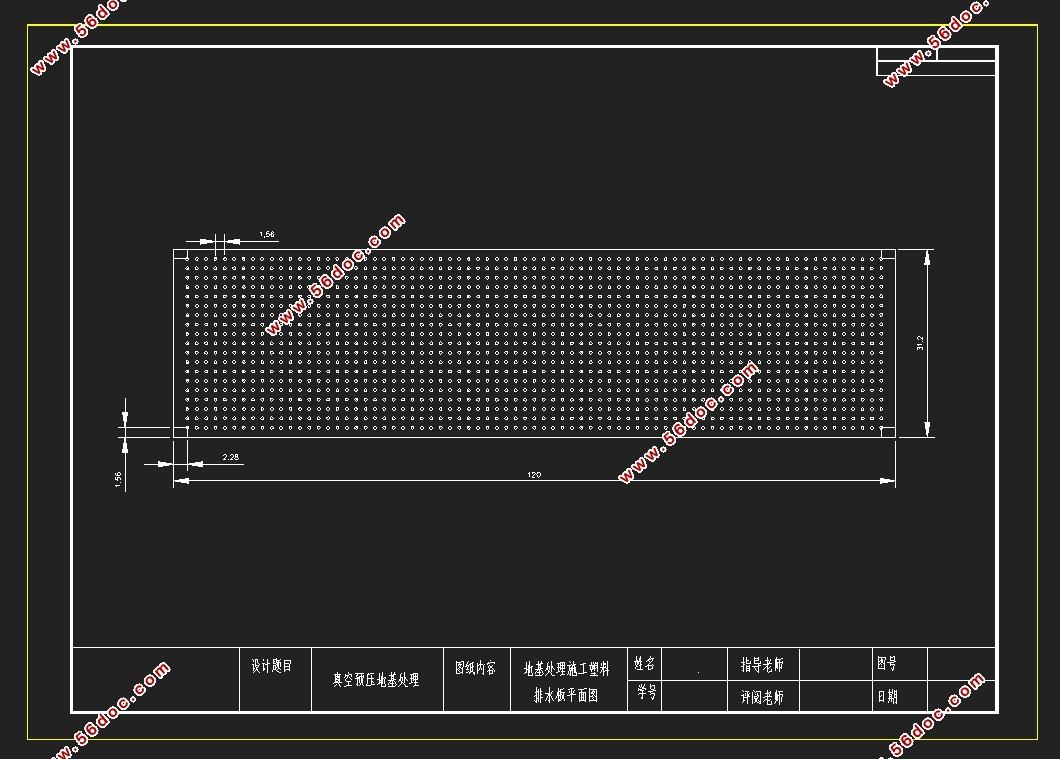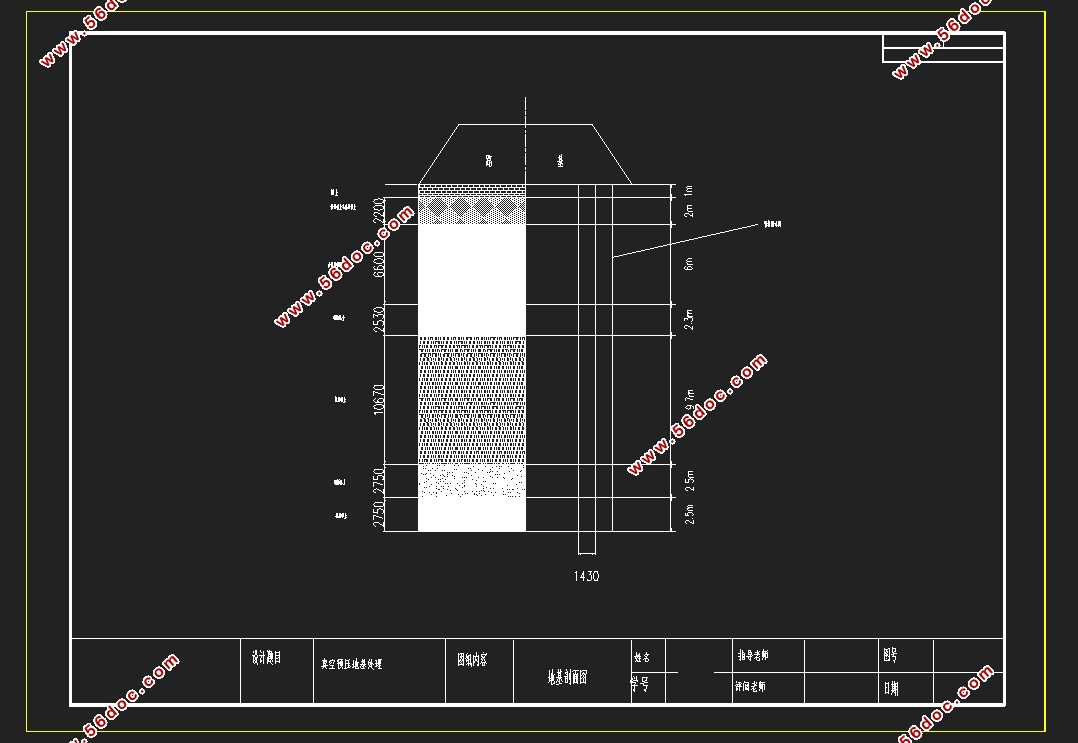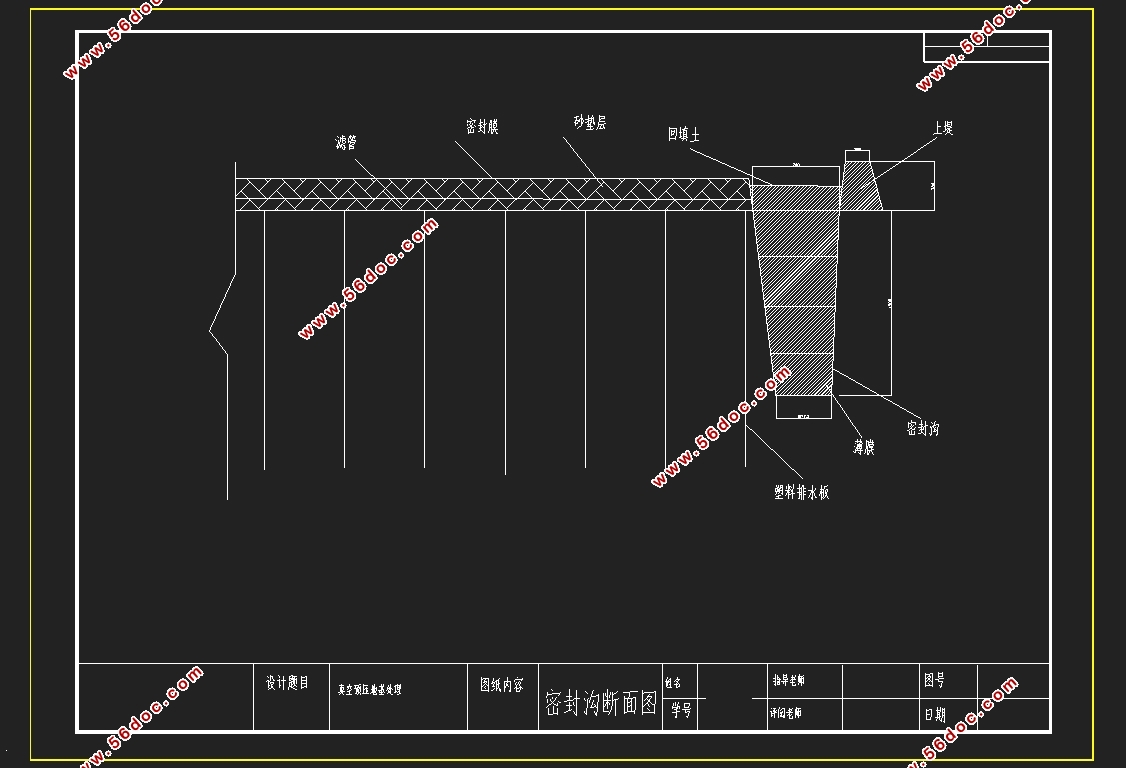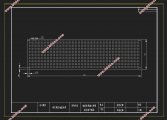某高速公路软基的真空预压处理(含CAD图)(任务书,开题报告,论文说明书11500字,CAD图3张)
摘要
我国地域辽阔,地址复杂,土的种类繁多,需处理的地基大多为软弱土和不良土,如软粘土,杂填土,冲填土,饱和细粉土,湿陷性黄土,泥炭土,膨胀土,多年冻土以及岩溶和土洞等不良地质作用和地质灾害。随着我国建设事业的发展,新建工程越来越多的遇到不良地基。由于软土具有强度较低,压缩性较高和透水性弱小等特性,因此在软土地基上修建建筑物,必须重视地基的变形和稳定问题。在软弱土地基上的建筑物往往会出现地基强度和变形不能满足设计要求的问题,因此常常要采取措施,进行地基处理。处理的目的是要提高软弱地基的强度,保证地基的稳定,降低软弱土的压缩性,减少基础的沉降和不均匀沉降。
本课程是一个实际工程的加固地基的问题。该路段为某高速公路软土路基一般路段,路段全长100m,路基的填土高度为4.75 m,边坡1:1.5(具体见任务书)。根据软土地基的特性,确定了真空预压排水法处理该软土地基。本文对真空预压排水法加固软土地基的原理,施工工艺和设计方法进行了研究。
关键字:软土地基 地基加固 真空预压排水法
Abstract
China's vast territory, address complex and a wide variety of soils, the need to deal with mostly weak foundation soil and poor soil, such as soft clay, miscellaneous fill, hydraulic fill, saturated fine soil, loess, peat soil, expansion soil, permafrost and soil cave karst and other adverse geological and geological disasters. With the development of China's construction, new construction encountered more and more poor foundation. As the soft soil with low strength, compressibility and permeability weak features such as high, so the construction of buildings on soft ground, must pay attention to the deformation of foundation and stability. In the buildings on soft soil foundation often appear foundation of strength and deformation can not meet the design requirements of the question, so often to take measures to deal with the foundation. The purpose of treatment is to improve the strength of weak foundation, to ensure the stability of the foundation, reducing soft soil compression and reduce uneven foundation settlement and settlement.
This course is a practical engineering foundation reinforcement issue. The road is a section of Highway Soft Foundation general, road length of 100m, the roadbed filling height 8 m, slope 1:1.5 (see specific mission statement). According to the characteristics of soft soil to determine the drainage vacuum preloading method to deal with the soft. In this paper, vacuum preloading Soft Soil Reinforced drainage principles, construction techniques and design methods were studied.
Key Words:Soft foundation; Foundation reinforcement; Drainage vacuum preloading method
(1)工程基本资料
某高速公路软土地基,该处理路段长100m,各土层厚度如表2所示。设计填土高度4.75 m,边坡1:1.5;
(2)工程地质条件如下
1.①填土,厚0.50~1.20m,杂色,松散,主要为素填土,上部含较多的植物根茎,局部含碎石砖块;
2.②1粉质粘土,厚0.80~0.80m,褐黄色,可塑,中等压缩性,含氧化铁斑;
3.②2粉质粘土夹粘质粉土,厚0.60~2.00m,灰黄色,可~软塑,中等压缩性,含少量的氧化铁斑,夹粘质粉土;
4.③1淤泥质粉质粘土,厚2.30~7.70m,灰色,软~流塑,高压缩性,夹薄层砂质粉土,局部夹粉质粘土,含少量的有机质;
5.③2砂质粉土,厚4.70~5.50m,灰色,稍密,夹薄层粉质粘土,含少量有机质;
6.③3粉质粘土,厚2.30~14.30m,灰色,流塑,高压缩性,夹灰色粉质粘土及淤泥质粘土,含有机质;
7.⑤1粉质粘土,厚6.70~10.70m,灰色,流塑,高压缩性,夹粘土及淤泥质粉质粘土,含泥质结核及半腐的芦苇根茎;
8.⑦2砂质粉土,未钻穿,灰色,中~密实,局部夹薄层粉质粘土,含粉砂。




目录
摘要 ………………………………………………………………………… ……………I
ABSTRACT ……………………………………………………………… ……………II
第一章 绪论………………………………………………………… ……………… …1
1.1 引言 …………………………………………………………… …………………1
1.2 真空排水预压法的历史和现状 ………………………………… ………………1
1.3 真空预压排水法的特点 ………………………………………… ………………3
1.4 工程概况 ………………………………………………………… ………………3
1.5 本文的主要工作 ……………………………………………… …………………4
第二章 软土地基沉降计算与地基处理 …………………………………… 6
2.1 软土地基的沉降计算 … …………………………………………………… 6
2.1.1 软土及其特征 … ……………………………………………………… 6
2.1.2 路基段面的确定 … …………………………… ……………………6
2.1.3 主固结沉降和总沉降的计算 …… … …………… ………… …………7
2.1.3.1 主固结沉降计算 ………… … …………… …………… …… ……7
2.1.3.2 瞬时沉降的计算 … …………… ……………………… ……… ……11
2.1.3.3 次固结沉降的计算 …… ……………………………… ……………11
2.1.3.4 总沉降的计算 …………………… …………………… ……………12
2.1.4 工后沉降的计算 ……………………………………………… ……12
2.1.4.1 地基平均固结度的计算 …………………… ………………… ……12
2.1.4.2 地基的总固结度计算 ……………………………… ……………… 13
2.2 地基处理设计 ……………………………… ………………… ………………15
2.2.1 软土地基处理的目的和意义 ………………………………… ………15
2.2.2 真空预压排水法的原理 …………………………………… …………15
2.2.3 本次设计运用真空预压排水法处理软土地基的思路 … ……………16
2.2.4 确定本方案的设计参数 ……………………………………… ………16
第三章 真空预压加固地基处理的施工工艺 ………… ……………………21
3.1 真空排水预压法的施工程序 …………………………………… ……… ……21
3.2 排水系统 ………………………………………………………………………22
3.2.1 场地平整……………………………………………………… ………22
3.2.2 竖直排水系统——塑料排水板和袋装砂井…………………… ……22
3.2.3 水平排水系统——砂垫层……………………………………… ……22
3.3 抽真空系统 ……………………………………………………………………22
3.3.1 主,滤管及其布置……………………………………………… ……22
3.3.2 主管的出膜装置………………… ……………………………………23
3.3.3 抽真空装备………………………… …………………………………23
3.4 密封系统 ………………………… ……… ……………………… ……… …24
3.4.1 密封膜及铺设………………………………… ………………………24
3.4.2 密封沟…………………………………………………………… ……25
3.4.3 土层深部的密封…………………………………………………… …25
3.4.4 加固过程中对地表裂缝的处理…………………………………… …25
3.5 加固过程中的管理 ……………………………………………………………27
第四章 结论……………………………… …………… ……………… ……………28
参考文献 ………………………………………………………………………………29
致谢 ………………………………………………………………………………………30
|









